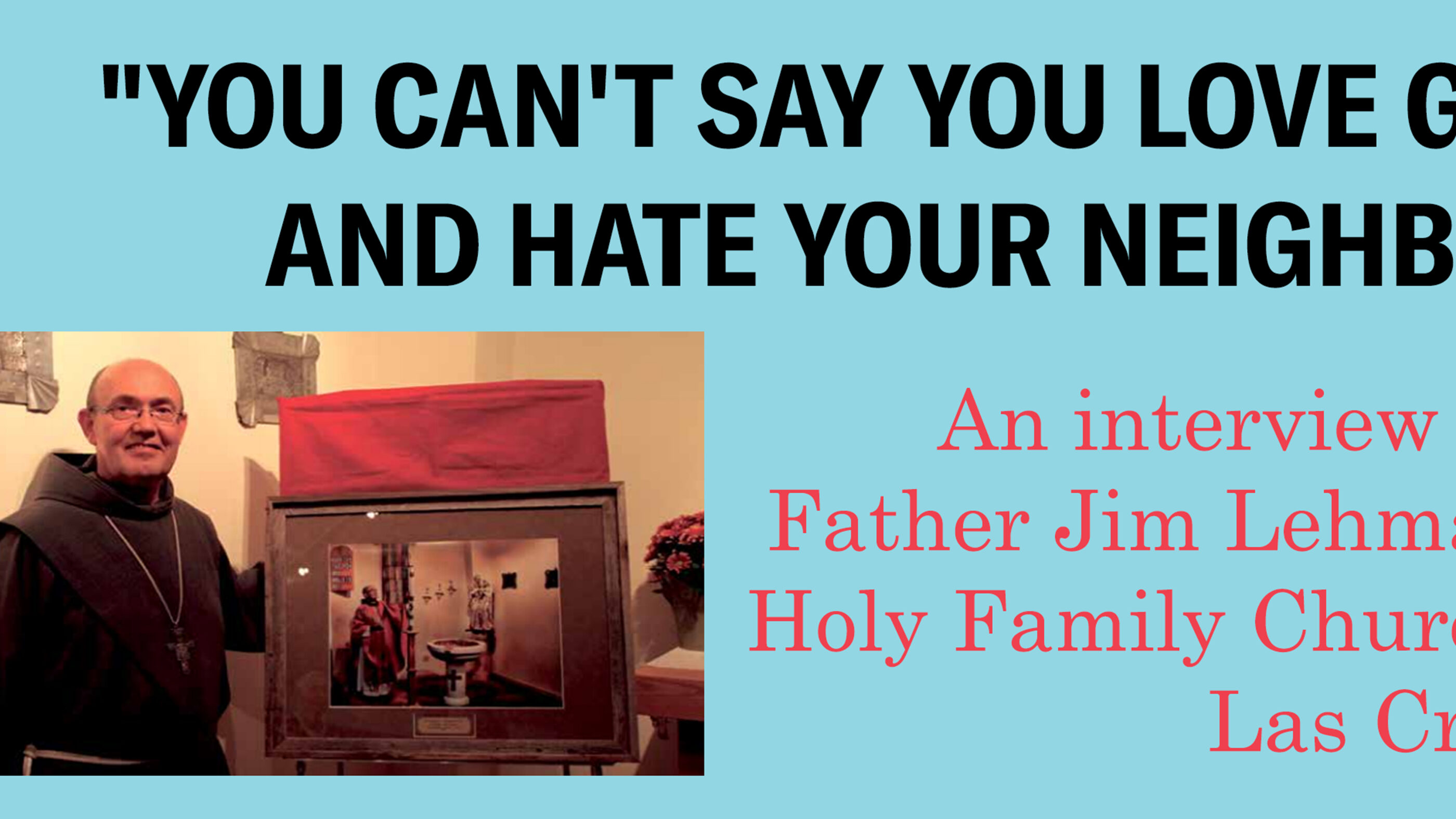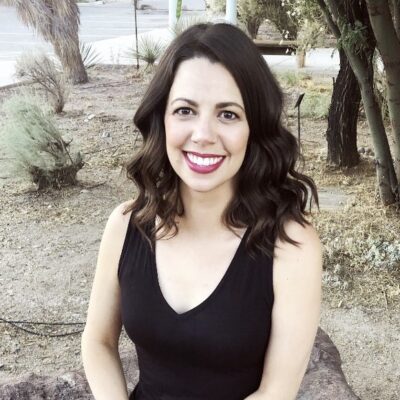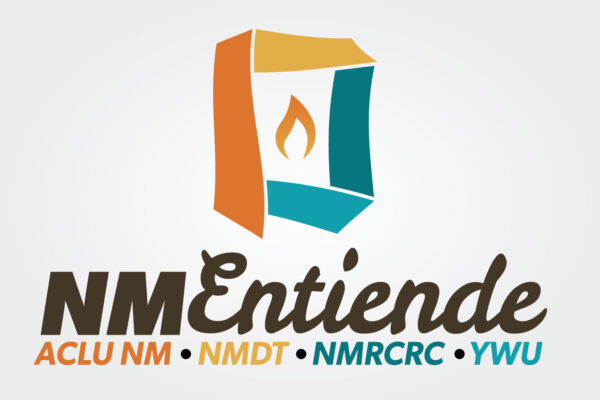An interview with Father Jim Lehman of Holy Family Church in Las Cruces
New Mexico is one of the top ten most Catholic states in the country, and the faith tradition is deeply intertwined with the history, identity, and culture of our state. Each Sunday, tens of thousands of New Mexicans pack historic churches for mass, seeking comfort, community, and meaning in the sacraments and rituals of the faith. For many Catholics, their religion is not only one of tradition, prayer, and contemplation, but one of bold action. Teachings of compassion, acceptance, and justice have inspired countless Catholics to fight for economic and social justice and advocate for the marginalized and oppressed, both here in New Mexico and around the world.
Many practicing Catholics are gay, transgender, use contraception, have had an abortion or love someone who has.
From pioneering Liberation Theology in Latin America, to supporting the farm worker movement in the American southwest, to protesting the inhumane and unjust U.S. immigration policies of today, Catholics have regularly been at the forefront of many social justice issues. Yet, we hear the same argument all the time. “You won’t get the Catholics on board for that issue.” There’s a common misconception that Catholics won’t rally for LGBTQ rights and that they do not trust women to make their own reproductive health decisions. But Catholics are not monolithic in their beliefs. They are a diverse group of people with overlapping and intersectional identities who don’t always agree with the Vatican’s stance on any particular given issue. Many practicing Catholics are gay, transgender, use contraception, have had an abortion or love someone who has. The same scriptures that encourage many Catholics to fight for the poor and to help immigrant families in detention often inspire them to fight for equality for their gay neighbors and to protect their loved ones’ bodily autonomy.
In order to dig a little deeper into the diversity within the Catholic activist community here in New Mexico, we sat down with Father Jim Lehman—a Catholic priest who founded an inclusive church in Las Cruces—for a conversation about why he believes the gospel calls us to love and seek justice for all people

KH: Tell us about what led you to form Holy Family American National Church.
Fr. Lehman: At about 18, I was in a religious order called the Alexian Brothers and we took care of the sick. And this was in Chicago and Wisconsin. After that I went to New York City and I began to study social work. Eventually, I got back involved with the church and got ordained in Santa Fe. Then, in about 1987 I moved down to Las Cruces and was hired as the administrator of the cathedral. And one day I thought of my sister who is a good Episcopalian and I thought about how technically, according to the rules, she couldn’t come to communion. And I thought, “Jesus surrounded himself with the lost and the marginalized and ate with prostitutes and tax collectors and pagans. Are we pushing people out of the church?” And that led me to form the parish Holy Family in 1995.
Jesus had no litmus test for the people he reached out to. I started the church to live out the gospel.
KH: So Holy Family is open and affirming of all people?
Fr. Lehman: Yes, Jesus had no litmus test for the people he reached out to. I started the church to live out the gospel. A friend of mine used to say, “Communion is not a reward for good behavior” because what happens is, well how do you define “good?” We have an open communion table. And we want people to go to communion because that is the sacrament of healing that gives them strength for the journey. And gives them the courage to live the gospel.

KH: Do you think Catholic theology is actually inherently accepting of all people, contrary to what many people think?
Fr. Lehman: Saint Paul said, “there is neither Jew nor Greek, neither slave nor free, nor male and female.” Today he would say, “You are not black or white, Muslim or Jewish, gay or straight. All are one in Christ Jesus.” In another scripture, Paul says, “What can the finger do without the eye and the hand without the ear?” What he is saying is, “You cannot push a part of the people of God out the door. It’s not okay because all are required.” If we are the body of Christ then we all are necessary to be that body. You can’t say well, “I don’t like transgender people” or “I don’t like gay people.” Paul would say, “It’s not okay.” We are judged on how we treat one another.
KH: I grew up Catholic and I wish I would have heard more of that growing up...
Fr. Lehman: Yeah. Too often, Roman clergy are preaching dogma and not necessarily the scriptures. The scripture is very clear. Last Sunday was the story of the Good Samaritan and the Samaritans were people who were hated. In the Gospel of Luke, A lawyer asks Jesus, “who is my neighbor?” in response to the teaching “Love thy neighbor like yourself.” And Jesus says, “Let me tell you a story.” He goes on to tell a story of this man who was beaten and left on the side of the road. No one would help him but the “lowly” Samaritan who the others considered to be an abomination. The Samaritan reached out and took care of the guy who was injured. And at the end of the story, Jesus said, “Who do you think was the neighbor?” And the lawyer said, “The one who showed mercy” and Jesus said, “Yeah.”

KH: Do you think Catholic values encourage Catholic New Mexicans to fight against injustices in their communities and to stand up for their fellow community members?
Fr. Lehman: In our community here, four young gay men from Latin America were stuck in detention for a couple months. In detention they were sexually assaulted and all sorts of bad things happened. So when they finally came out of detention we helped them to settle here and then eventually in upstate New York and New York City. That’s what the gospel tells us to do.
KH: You’re a part of the the American National Catholic Church, not the Roman Catholic Church?
If we are allowed to discriminate against one group, then what?
Fr. Lehman: Yes. There’s a movement in the country called the Independent Catholic Movement. There’s probably a million independent Catholics in the United States and 300 or 400 Bishops. Internationally the independent Catholics are called the Old Catholics and they pulled away from the Vatican after the First Vatican Council because they did not see the pope as infallible.
KH: Is there anything else you want to share?
Fr. Lehman: The bottom line is that in John it says, “If you say you love God and you hate your neighbor, you are a liar.” That’s as clear as it could be. Paul says, “All things will pass away except love.” So, we are judged on how we love. We’re not called to judge other people or the decisions they make. If not, it’s a slippery slope. If we are allowed to discriminate against one group, then what?
Do you know the story of the Lutheran minister in Germany? He said, “First they came for the socialists and I didn’t speak out because I wasn’t a socialist. Then they came for the trade unionists, and I did not speak out because I was not a trade unionist. Then they came for the Jews, and I did not speak out because I was not a Jew. Then they came for me—and there was no one left to speak for me.” Today, we can say, “They came for gay people, and I wasn’t gay so I was quiet”… and on and on…. “And then they came for me and there was no body left.”



